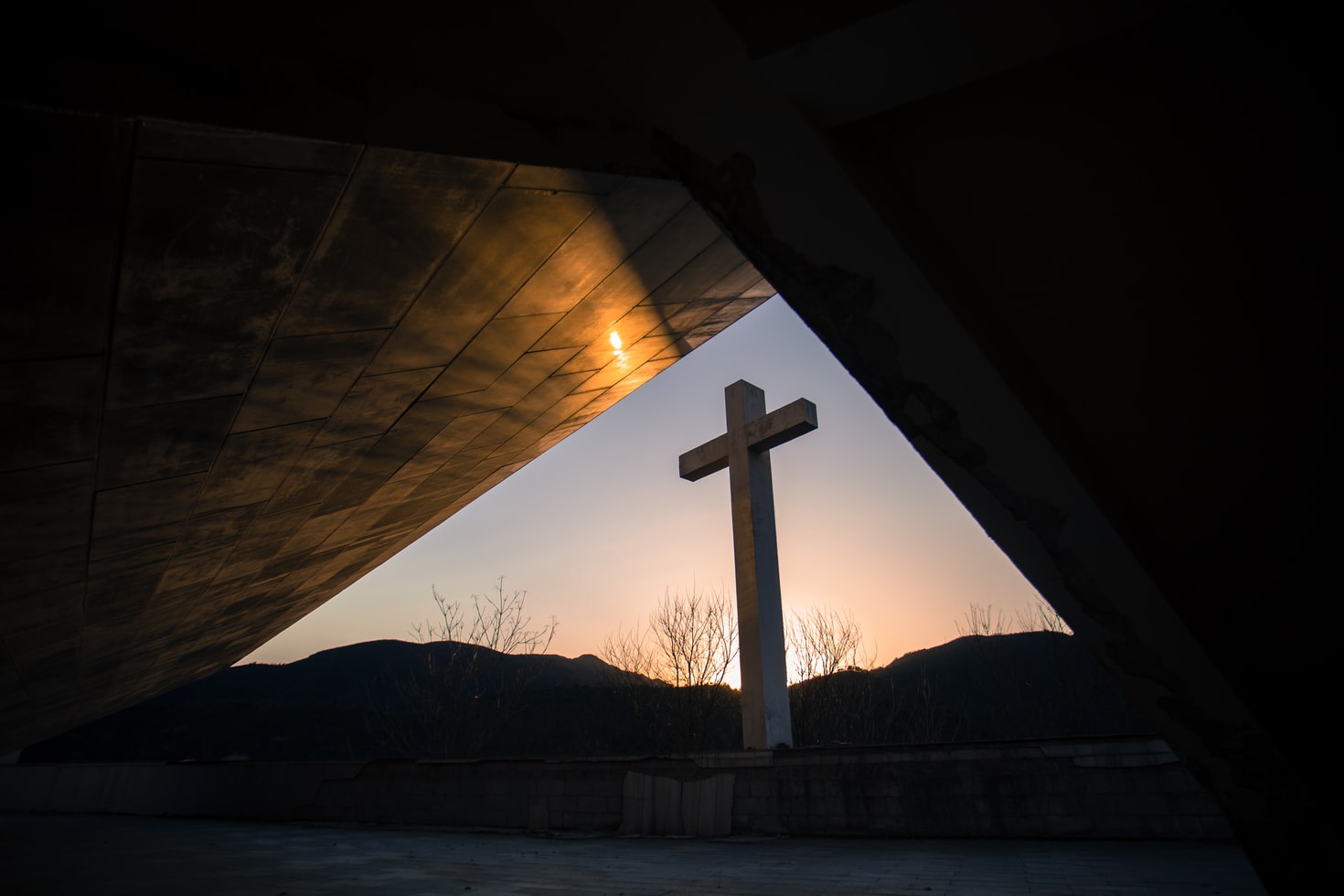The death that shook the world (Matthew 27:51-54)

Death feels so final. God did not intervene to prevent Jesus’ death. As I read Matthew, I feel the need time to absorb the enormity of this tragedy, to process the loss, to grieve at the injustice, to feel the familiar futility of a world where God’s anointed falls.
Matthew doesn’t pause. He hurtles on with disjointed details from a turbulent timeline, confusing our grief:
Matthew 27:50–53 (my translation, compare NIV)
50 Jesus again cried out in a loud voice, and released his spirit.
51 And look: the partitioning curtain of the temple was split from above, all the way down, into two pieces; and the earth was shaken, and the rocks were split, 52 and the graves were opened and many bodies of the holy people who had fallen asleep were raised, 53 and having come out of the graves after his resurrection, they went into the holy city and appeared to many.
Temple broken? Earth quaking? Solid rock breaking apart? Undead standing up, walking into Jerusalem, terrifying people? What on earth is going on?
Some of this happened at the point of his death when the earth shook and the darkness receded (27:45). Other elements occurred after his resurrection. God has not acted to save his Son in the timeframe we would expect, but God is still acting.
That’s the point of the passive voice. Who was acting when the curtain was split, when the earth was shaken, when the rocks were split, when the graves were opened, when the holy people were raised? In the face of the unimaginable evil of crucifixion of the Christ, God has not abandoned his Son, and he has not abandoned his world.
That’s Matthew message, the reason he won’t leave us stewing in our grief.
The curtain of the temple
The temple was understood as holy space, devoted to God, with a series of courtyards that marked it off from the profane world. It was the house God’s people provided for their heavenly sovereign to dwell among them and lead them (Exodus 25:22). Dedicated royal servants could enter his house to serve him in the holy place, but they were not permitted in the private chamber where Israel had provided a throne (ark) for God to sit enthroned between the guardian cherubs (1 Samuel 4:4 etc.)
So what would it mean if the curtain between the God and his people was torn open?
Matthew leaves us in no doubt that it was God who ripped the curtain open. It was torn from above (ἀπʼ ἄνωθεν), all the way down (ἕως κάτω), into two (εἰς δύο).
Why had God torn the curtain open? Was he leaving his house in anger over what they had done?
Once before, God had left the house because of the detestable things his people had done (Ezekiel 8–11). It fell to Babylon, because God’s house had become a den of robbers (Jeremiah 7:11). Jesus declared the temple to be in the same state (Matthew 21:13). It would no longer be God’s house (24:2).
But instead of listening, the temple leaders accused Jesus of blaspheming God’s authority by announcing the fall of the temple (26:61; 27:40). The high priest had torn his priestly robe at this violation of divine sanctity (26:65), and now God had torn the temple order apart. God had not abandoned his Son; he had abandoned his temple.
Matthew does not explain why God moved out of the temple they made for him (compare Hebrews 10:20), but he’s very clear that God is still moving in the world he made.
The earth
The earth shaking would have been perceived as an indication of God shaking up the created order (compare 28:2; Isaiah 2:19-21; Hebrews 12:26-27). When the rocks split, nothing feels secure — especially since the rock on which the temple was built was perceived as the foundation of the earth.
Israel’s story began with God splitting the Sea to rescue his people (Exodus 14). Prophetic tradition spoke of God splitting the rocks to the east of Jerusalem to rescue his people so the Lord will be king over the whole earth (Zechariah 14:4, 9). We’ve seen Jesus repeatedly referring to latter Zechariah in describing how he would implement the kingdom.
God tore open the temple and split the rocks, but he hasn’t rejected his earthly realm. He opened graves and raised some people as a consequence of his resurrection.
Everything else is shaken, but not the kingship of the Son:
Psalm 16:8–10 (NIV)
8 I keep my eyes always on the Lord. With him at my right hand, I will not be shaken. 9 Therefore my heart is glad and my tongue rejoices; my body also will rest secure, 10 because you will not abandon me to the realm of the dead, nor will you let your faithful one see decay.
Those are the words of the Davidic king, proclaimed in the first gospel sermon (Acts 2:25-28).
Dead saints coming to life
So, what happened the dead saints whom God raised up with Son? Speculation is pointless. Matthew doesn’t address our curiosity.
His point is that the world is now a different place. Unclean bones went into the graves, but holy people (saints) came out. They’re sent to appear to many in the city that crucified its Lord, but it’s now called the holy city.
God may have ripped open the temple, but he has not abandoned his people. These deceased people stand as evidence of his resurrection, that God has raised up his Christ to reign, and the capital is now his holy city. The world is under new management.
Transforming all authority
Now the unexpected twist. The holy city was supposed to be occupied by the holy people. Instead, it had been occupied by the nations, held captive to the soldiers of the empire. For centuries.
Does God shaking up the world address this problem?
27 54 When the centurion and those guarding Jesus with him saw the earthquake and what had happened, they were extremely frightened, saying, “This really was the son of God.”
Previously, the guards had not taken Jesus seriously. Sitting down and playing games, they treated this King of the Jews as a joke rather than a threat (27:35). Now these trained soldiers are scared witless as they recognize a force far greater than themselves, shaking everything. They recognize Jesus as the God-appointed ruler, attributing to him the title Caesar claimed: son of God.
Conclusion
We’re no longer in Kansas. God has rejected the temple regime that previously maintained his house, tearing the temple order apart. God has shaken the earth and split the rocks, so it’s not the same world as before. God has commissioned messengers from the dead to present the resurrection. And foreigners — the armies of oppressors, those who ensured the death of his king — are declaring Jesus to be the God-appointed ruler.
God has stepped out of the holy temple, into the place called the holy city. It is holy because God is there (Ezekiel 48:35).
All the promises of Daniel and Ezekiel and Jeremiah and Isaiah and Zechariah are finding their fulfilment in the kingdom of God’s anointed over all the peoples of the earth.
What others are saying
R. T. France, The Gospel of Matthew, NICNT (Grand Rapids, MI: Eerdmans, 2007), 1081–1082:
This resurrection of dead people has no parallel in the other gospel accounts, and leaves plenty of unanswered questions for the historically-minded interpreter. … The “holy people who had died” are presumably to be understood as pious Jews … Several OT texts talk of resurrection for God’s people in some sense, the most explicit being Dan 12:2 and, probably, Isa 26:19. Matthew’s wording here especially calls to mind Ezek 37:13, “when I open your graves and bring you up out of your graves, my people” (note also the earthquake-like imagery in Ezek 37:7), though there resurrection is a metaphor for national restoration rather than a promise of personal life after death. Matthew explicitly links the resurrection of these unidentified people with that of Jesus. …
Craig S. Keener, The Gospel of Matthew: A Socio-Rhetorical Commentary (Grand Rapids, MI: Eerdmans, 2009), 687–688:
Whereas his own people had not believed, the supervising centurion … recognized Jesus’ identity the way Peter had some time before (16:16). In contrast to Peter, however, these Gentiles recognize Jesus’ Sonship in the cross, rather than by ignoring it (16:21–22), all the more remarkable because this defied Gentile models of leadership (20:25). … The pagans one would expect most hostile to Christ have understood and embraced his true identity (2:1–12). …
Ironically, the Roman centurion, a participant in Jesus’ torments, recognizes without prompting what the Sanhedrin had denied: Jesus is God’s Son (27:54). Fellow members of Jesus’ own ethnic community ridicule Jesus’ Sonship (27:40, 43) based on a statement they themselves elicited (26:64); by contrast this Gentile persecutor becomes the first person after Jesus’ death to concur with Jesus’ identity announced by God in 3:17 and by Peter in 16:16.
Seeking to understand Jesus in the terms he chose to describe himself: son of man (his identity), and kingdom of God (his mission). Riverview Church, Perth, Western Australia
View all posts by Allen Browne




